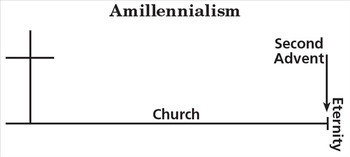What Is Amillennialism?
- Timothy J. Demy and Thomas Ice Crosswalk Contributor, Crosswalk Contributor
- Updated Apr 26, 2022

What Does Amillennialism mean?
Amillennialism is the view or system of eschatology (doctrine of the last things) that holds that there is no literal earthly millennium (thousand-year reign of Jesus Christ on the earth). Amillennialists believe that the millennium is spiritual. While all versions of amillennialism unite around their belief in no earthly millennium, they sometimes differ as to the exact nature and time of the millennium. While all believe that the millennium is spiritual and thus not earthly, some believe that the spiritual kingdom is present during the current era of the church. Some amillennialists believe that the present spiritual reign of God’s kingdom consists of the influence that the church exerts through its many worldwide ministries.
Another form teaches that the millennium is composed of the reign of all dead Christians in heaven. Yet another kind believes that the millennium is equal to the eternal state that will commence at the second coming of Jesus Christ to the earth (known also as the second advent). In this view, the new heavens and new earth equals the millennium.
What Does Amillennialism teach?
Amillennialism teaches that from the ascension of Christ in the first century until His second coming (no rapture) both good and evil will increase in the world as God’s kingdom parallels Satan’s kingdom. When Jesus Christ returns the end of the world will occur with a general resurrection and general judgment of all people. It is essentially a spiritualization of the kingdom prophecies.
Origins of Amillennialism
Amillennialism was not present in the earliest era of the church. (At least there is no positive record of its existence.) It appears to have developed as a result first of opposition to premillennal literalism, and then evolved into a formal system. Amillennialism came to dominate the church when the great church father and theologian Augustine (354–430) abandoned premillennialism for amillennialism. It would probably be safe to say that amillennialism has been the most widely held view for much of the church’s history, including most of the Protestant Reformers of the sixteenth century. Dr. Ryrie writes of amillennialism:
One of the popular reasons for preferring amillennialism over premillennialism contrasts the premillennial concept of fulfillment in an earthly kingdom (usually the adjective carnalis placed with this phrase) with the amillennial concept of fulfillment of Old Testament prophecies in the church in this age (and usually the adjective spiritualis put with this phrase). Thus the system which emphasizes the spiritual church rather than the carnal kingdom is to be preferred. When I hear or read this argument, I want to ask, Since when is the church only spiritual and the kingdom only carnal? The church (look around) has carnal people in it, and the kingdom will have many spiritual facets to it. Spiritual and carnal characterize both the church and the future kingdom.
Always, of course, the conclusive evidence for the truth of a doctrine is not its historical legacy, but rather, its exegetical accuracy.

Copyright 2011 Timothy J. Demy and Thomas Ice
Used by permission. All rights reserved.
Kregel Publications
P.O. Box 2607
Grand Rapids, MI 49501
Photo credit: ©GettyImages/thekopmylife
This article is part of our larger End Times Resource Library. Learn more about the rapture, the anti-christ, bible prophecy and the tribulation with articles that explain Biblical truths. You do not need to fear or worry about the future!
Battle of Armageddon
Tribulation
Signs of the End Times
The Four Horsemen of the Apocalypse
The Seventh Seal Opened
What Is the Death Angel?



















